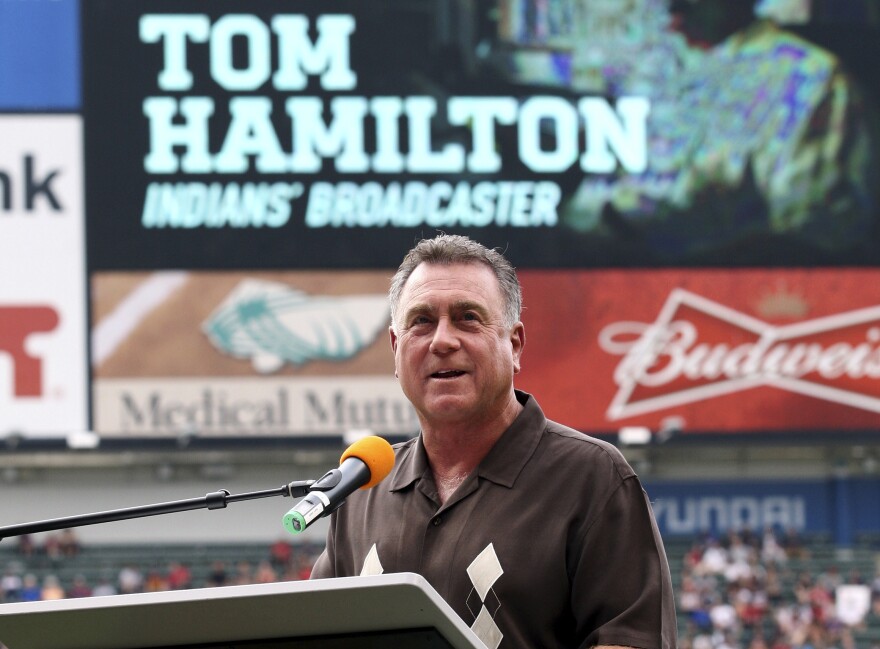For many Cleveland baseball fans, Tom Hamilton is the soundtrack of the summer. He's been the radio play-by-play announcer for the entirety of the teams' successful stay at Progressive Field, which opened in 1994. Several home run calls have gone viral in recent years (Hamilton has multiple YouTube channels dedicated to him) and fans still hope to hear Hamilton say "You will have an October to remember," signifying a clinched playoff berth for Cleveland.
Hamilton will be honored by the Baseball Hall of Fame this weekend with the Ford C. Frick award.
It's hard to believe that Hamilton's 35-year career in Cleveland almost didn't happen.
"He spent five year in two Wisconsin towns, Shell Lake and Appleton," said Ideastream Public Media sports commentator Terry Pluto. "In fact, at one point, he talked about 'I was working 60 hours a week at the radio station and tending bar and I still couldn't make $20,000.'"
Hamilton also did play-by-play for minor league baseball at the time and thought his big break might come when he interviewed to be the play-by-play announcer for the University of Nebraska football team. Instead, an excited program director came out to tell Hamilton they had just hired someone else.
When Hamilton did get hired at a bigger market in Milwaukee, he was laid off a few months later.
"He said he was doing voiceovers for insurance commercials and selling some insurance on the side and (he's) sitting there going 'Is this ever going to change for me?'"
Hamilton got a surprise call from a station in Columbus, where he had interviewed a few months prior. Getting the chance to do morning news and sports got Hamilton regular air time again, but he also volunteered to help broadcast the Triple-A Columbus Clippers games.
Still, Hamilton was hesitant to apply for the job in Cleveland.
"He was just doing two innings (per game) on the Columbus broadcast...and his wife, Wendy, who was also in radio in Columbus, said 'Oh Tom, you've got to apply. You've got to apply.'"
The Hamiltons spent one Christmas Day poring over Hamilton's tapes from Clippers games before sending his work to Cleveland.
"Somebody from the Clippers told the Tribe people, at that point, to take a look at this tape and Tom basically got hired from that, for a job he almost didn't apply to and that was 1990," Pluto said.
Pluto said Hamilton's path to major professional sports and his style in the booth reminds him of another Cleveland legend, former Cavs play-by-play announcer Joe Tait, who was the 2010 Curt Gowdy Media Award from the Naismith Memorial Basketball Hall of Fame. A lunch with Hamilton and Tait hammered home the similarities to Pluto.
"I realized they both grew up in farms in the Midwest," Pluto said. "They both listened to radio while doing chores on the farm. They both dreamed of getting off the farm. They had no idea how to get off the farm to a major market, because they grew up in rural areas."
Pluto said those upbringings shaped the fan friendly styles of Hamilton and Tait.
"It's a voice in the night," Pluto said. "It's background. It's still telling the colors, the weather, and please, tell the score."
Another similarity between Hamilton and Tait, aside from their Hall of Fame credentials, is their ability to be honest and critical, without resorting to personal attacks.
"He made you feel like he was invested in the team and wasn't a sellout, even though he's paid by the team," Pluto said. "Sometimes I know they cringed at some of the stuff he said, but also, I think, the teams knew that they needed that voice."
Not everyone is cut out for the grind of 162 games in Major League Baseball. The work, the monotony, the months away from family. But Hamilton's preparation hasn't waned in 35 years.
"He still goes down and talks to the players, checks with the manager, all that," Pluto said. "He doesn't act like he's just mailing it in and I've seen other broadcasters who do that."
For perspective on what makes Hamilton's home run calls so iconic, Pluto checked in with Hamilton's radio partner, Jim Rosenhaus, who spent more than a decade in Triple-A baseball and would listen to Hamilton after his game was over.
"(Rosenhaus said) 'I listened, he goes, there's a swing and a drive, way back, gone, and then silence. Then Tom would stop and let the crowd, the fireworks, all that, come in,'" Pluto said. "Some people just keep talking. (Hamilton) builds this crescendo and then backs off. It makes you feel like you're at the ballpark"
During games, Hamilton still thinks about who could be listening, according to Pluto.
"Tom knows that there may be still some kid in some barn somewhere in Central Ohio listening to him do the games like when he was milking cows in Wisconsin listening to those Milwaukee baseball games," Pluto said. "It's the same thing. It's phenomenal. Even if the person is listening to it through their phone. It's the same broadcast."



